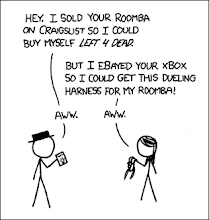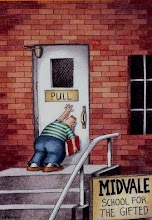Are the financial decisions our nation's leaders have been making a help to the present economic woes or an opposition? I'm currently reading a fairly dull-sounding book called "Rethinking the Great Depression: A New View of Its Causes and Consequences" by Gene Smiley (2002). "Why are you reading that?" I am asked by anyone who ever sees what I am reading. Except my wife, Jamee--she knows its simply because I'm a geek, but... As far as this book goes, can you name a more important financial event of that entire century? Thought not.
So this book was published 7 years ago about events of more than 70 years ago. But, as George Santayana said, "Those who cannot remember the past are condemned to repeat it." A supplemental but less notable quote is (paraprased), "We have spent the last 100 years ignoring the lessons from history because in hindsight everything they have done looks retarded."
I don't know about you, but I'm disturbed by the financial news over the last couple years, ranging from Enron, Tyco, and (many) other corporate scandals, to stories of incompetence and greed like Fannie Mae, Freddie Mac, AIG, Angelo Mozilo's Countrywide and IndyMac Bank, BofA redefining buyer's remorse with Countrywide, Lehman, Merrill, Bear Stearns, Goldman Sachs, Morgan Stanley, and on and on...
The economy was a major factor in the election, and rightly so. Ostensibly, what Pres. Obama and company want (hope&change) to achieve is stability, growth and other improvements in our economy, but how are we going about it?
Large scale financial mistakes and successes from the Depression era should be our basic road map. These lessons from the past should not all have to be painfully relearned. I think I can sum up the scariest parts of these 160 pages in a few paragraphs. So here's what happened before; see if any of it sounds familiar.
After WWI, Europe agriculture production is down & demand is up. U.S. farmers borrow to purchase additional land and machinery, and farmland values increase.
Florida real estate booms for several years, much around Miami, then collapses. Hmmm...
Europe recovers quickly, ag prices fall 53.3% between 1920-21. Farm forclosures throughout the 20's. Other than that, mining and some textiles down, but everything else is rosy. Stock market booms until October 1929 crash (Dow Jones index peaked at 381 and finally bottomed at 198.
Ok, heres a 10-year chart of the Dow Jones Average with a peak of over 14,000 in mid and late 2007, and bottoming out under 7,000 in 2009. Hmmm...
Back to the past-President Hoover, wanting to avoid wage declines and increased unemployment as in the depression of 1920-21, conferenced with leaders of industrial, construction, and public utility firms at least 6 times in November '29 to get them to allow profits rather than wages to fall. A new division in the Commerce department attempted to speed federal construction projects. Hoover proposed a tax reduction to help boost the economy, and legislators voted to increase public works spending by $400 million. Hoover proposed establishing, with $100 million from the Treasury, a Federal Farm Board to fund co-ops to buy agricultural commodities when the prices were falling. Basically, bail out farming by artificially boosting their product prices. $150 million to wheat co-ops in November, $10 million to centralize the marketing of grains, and $100 million more to the Federal Farm Board in 1930 to buy more wheat. This accumulation of surplus turned off investors, and prices continued to fall. Ultimately, the Federal Farm Board ended up selling the inventory, depressing prices worse than if they had never become involved, and worsening the depression in the agricultural sector.Sounds like what will certainly happen with any industry that our gov't interferes with. GNP per capita fell 10.8% between '29 and '30.
From CIA World Fact Book:
The merchandise trade deficit reached a record $847 billion in 2007, but declined to $810 billion in 2008, as a depreciating exchange rate for the dollar against most major currencies discouraged US imports and made US exports more competitive abroad. The global economic downturn, the sub-prime mortgage crisis, investment bank failures, falling home prices, and tight credit pushed the United States into a recession by mid-2008. To help stabilize financial markets, the US Congress established a $700 billion Troubled Asset Relief Program (TARP) in October 2008. The government used some of these funds to purchase equity in US banks and other industrial corporations. In January 2009 the US Congress passed and President Barack OBAMA signed a bill providing an additional $787 billion fiscal stimulus - two-thirds on additional spending and one-third on tax cuts - to create jobs and to help the economy recover.
Reminds me of that Federal Farm Board thing I heard about one time, hmmm...

Average unemployment in 1929: 3.2%, by 1930 it was 8.9% and rose to more than 14%.Average unemployment Oct. 2006: 4.1%, by March 2009 it was 9%.
Drought in the southern states causes farm loan defaults, that plus bad loans and bad investments lead to bank failures, causing many Americans to withdraw their money quickly and completely in a short period of time (called a run on the bank), causing even more bank failures. Hmmm...
Other countries experienced similar bank failures and depressions, but it was longer more severe in the U.S. Hoover held economy conferences, discussed cutbacks in government spending, and then massively increased taxes including doubling income tax. Decline in sale of Ford cars led to massive layoffs in '31 and '32. Hmmm...
In '33 several farming states established one-year moratoriums on farm mortgage foreclosures, and the Supreme Court upheld the constitutionality of it despite the Fifth Amemdment's protection against the taking of private property--in this case, that of the mortgage holders.
Presidential election gave Roosevelt a victory and swept a Democratic-dominated Senate and House into power. Hmmm...
He ran a campaign that was notable for being the first to extensively use radio to communicate, which reminded me of Obama and Twitter postings, web casts, etc. Roosevelt is known for the New Deal, social programs, Social Security (Having one arm of the government (Social Security) own IOUs from another arm (the Treasury) doesn't help the government as a whole cover its bills. ) which is projected to be negative half a trillion dollars by 2030.
Here's the thing--the national economy comprises a vast number of complicated intertwined causes and effects. It's just like grandma used to say about dual rotation light and medium duty hydraulic motors--the higher the cubic inch displacement, the lower the rpm--the inch pounds of torque goes up, but the psi goes down. OK, she never said that, but it applies...Reduction in money supply lowers price of goods and services. Deflation reduces price levels. This causes increased money supply elsewhere, along with rising prices, which leads eventually to fewer sales, and then back to a reduced money supply. This is apparently a very poorly-understood part of the supply-demand cycle. When the government sticks its stupid face into private business, say by tinkering with interest rates at which banks get money...it causes a reduction in domestic investment , which causes declines in economic activity, rising unemployment, and falling prices. Not to mention the creation of money by the U.S. or other countries to buy war supplies during the world wars that artificially inseminated the entire money supply..uggh. So if the tinkering appears to have an undesired effect, they turn the knob the other way--move interest rates the opposite direction. To me it seems that any interference that is not part of the consumer demand, supplier react and provide cycle will have unintended and unpredictably bad results. Leave the economy to the people legitimately involved, and it will work itself out.
All I can say is to Contact Your Elected Officials and let them know you would like them to stop hosing us.













